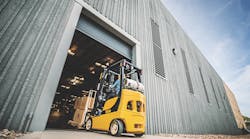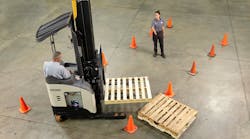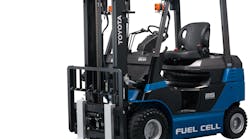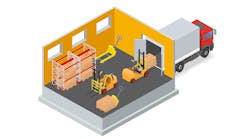The demand for shipped goods is only increasing. As the distribution industry continues to adapt, it can be easy for employees to overlook basic forklift safety information in the push for increased productivity. However, no matter how busy it gets, it is important to keep employees safe.
With a safety-first workplace in mind, here are a few tips on forklift safety.
The Basics: Forklift Safety
Buckle up every time while operating a forklift. This may seem obvious, but it’s one of the most important tips to remember. Overturned forklifts are one of the leading causes of forklift-related accidents.
Wear proper employer-required personal protective equipment (PPE) such as hard hats, protective footwear, eye protection and high-visibility clothing.
Move slowly and use the horn when vision is obstructed or to alert pedestrians and other operators.
Use caution on grades or ramps. When traveling down a ramp with a loaded forklift, always travel in reverse with the forklift and load pointed up the grade. When ascending a ramp with an unloaded forklift, keep the forks pointed downgrade.
Know your forklift’s weight capacity and stay within those bounds. Exceeding the weight capacity of a forklift significantly increases the risk of tipping the machine. Double-check weight capacities in the operating manual or on the machine itself.
Use the parking brake, lower the forks and set controls to neutral when finished operating a forklift. By safely parking the machine, the risk of unintended movement is reduced. If the machine is parked on an incline, wheel blocks can be used to secure the machine further.
Inspect forklifts regularly to ensure all parts are working correctly. Regular maintenance helps prevent unnecessary damage to the equipment and keeps employees safe.
Keep forklifts clean and free from excess oil and grease.
Safe Practices for Operating Propane Forklifts
Forklifts are powered by a variety of energy sources, and each requires its own set of safety procedures. Depending on what is used on-site, it’s important for employees to be aware of energy source-specific safety measures.
Propane is a nontoxic, colorless and inert fuel source that can be used in different applications. As a safety precaution, an identifying odor is added to propane so it can be readily detected in case of leaks. With nearly 90% of all Class 4 and 5 forklifts across the United States being powered by propane, it’s important to share and practice proper handling tactics.
Store propane cylinders horizontally in a secure rack or cage located away from exits, entryways, stairwells and other high-traffic areas. Ensure the relief valve is at the topmost 12 o’clock position and keep heat, flames and ignition sources away at all times.
Handle propane cylinders with care. User proper lifting techniques and always wear protective gloves and eyewear. Do not drop, throw or drag cylinders.
Inspect cylinders before operation. Check propane cylinders for excessive rusting, dents, gouges, cracks in the weld, and leaks. Do not use cylinders that show signs of wear or leaks as they may need to be replaced even if it’s within the requalification date. Also, inspect fuel lines and connector couplings for damage and signs of aging.
Secure the pressure relief valve so it is fitting roughly 180 degrees from the forklift’s locating pin. Ensure the valve is clean, unrestricted and directed upward at a 45-degree angle when mounted horizontally.
Ensure the cylinder pin enters the locating hole when installing a filled cylinder in the cradle.
Close service valve when not in use. Closing propane cylinder valves helps prevent potential injury from internal combustion engines and unintended fuel loss.
Check for leaks using a leak detector solution. If a leak is found, close the valve immediately and do not use.
Conduct regular maintenance on your forklift fleet to keep them running in tip-top shape. For example, if your machine is loud while running, check the exhaust system for failing gasket or rusting bolts as this can prevent exhaust gases from releasing properly and endanger employees.
The only thing more important than keeping employees productive is keeping them safe and choosing propane as your energy source can help you do just that. Propane suppliers have hours of safety training and can teach your crew safe handling practices, such as how to properly connect a cylinder to a forklift. Additionally, scheduling ongoing, regular safety briefings is a great way to keep safety top-of-mind for employees throughout the year.
Joe Calhoun is director of off-road business development for the Propane Education & Research Council (PERC).



